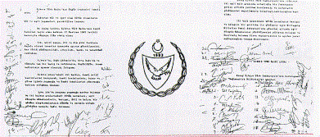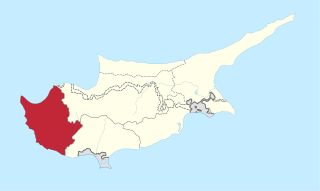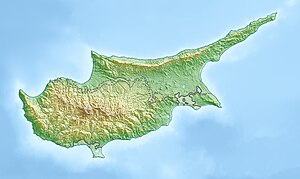
Cyprus, officially the Republic of Cyprus, is an island country in the Eastern Mediterranean and the third largest and third most populous island in the Mediterranean, located south of Turkey, west of Syria and Lebanon, northwest of Israel, north of Egypt, and southeast of Greece.

The people of Cyprus are broadly divided into two main ethnic communities, Greek Cypriots and Turkish Cypriots, who share many cultural traits but maintain distinct identities based on ethnicity, religion, language, and close ties with their respective motherlands. Before the dispute started in 1964 the peoples of Cyprus were dispersed over the entire island.

The Republic of Cyprus is a unitary presidential representative republic, whereby the President of Cyprus is both head of state and head of government. Executive power is exercised by the government. Legislative power is vested in both the government and the parliament. The Judiciary is independent of the executive and the legislature.

Nicosia is the largest city, capital, and seat of government of the island of Cyprus. It is located near the centre of the Mesaoria plain, on the banks of the River Pedieos.

The Cyprus dispute, also known as the Cyprus conflict, Cyprus issue or Cyprus problem, is the ongoing dispute between the two communities of the island and the Turkish military invasion and occupation of the northern third of Cyprus since 1974. Although the Republic of Cyprus is recognized as the sole legitimate state – sovereign over all the island – the north is under the de facto administration of the self-declared Turkish Republic of Northern Cyprus, which is guarded by Turkish Armed Forces. Only Turkey recognizes the Turkish Republic of Northern Cyprus, while there is broad recognition that the ongoing military presence constitutes occupation of territories that belong to the Republic of Cyprus. According to the European Court of Human Rights, the Turkish Republic of Northern Cyprus should be considered a puppet state under effective Turkish control.

Northern Cyprus, officially the Turkish Republic of Northern Cyprus, is a de facto state that comprises the northeastern portion of the island of Cyprus. Recognised only by Turkey, Northern Cyprus is considered by the international community to be part of the Republic of Cyprus.

The national flag of Cyprus came into use on 16 August 1960, under the Zurich and London Agreements, whereby a constitution was drafted and Cyprus was proclaimed an independent state. The flag was designed by art teacher İsmet Güney. The flag deliberately chose peaceful and neutral symbols in an attempt to indicate harmony between the rival Greek and Turkish communities, an ideal that has not yet been realized. In 1963, Greek Cypriot and Turkish Cypriot communities separated because of Cypriot intercommunal violence.

The United Nations Buffer Zone in Cyprus is a demilitarized zone, patrolled by the United Nations Peacekeeping Force in Cyprus (UNFICYP), that was established in 1964 and extended in 1974 after the cease fire of 16 August 1974, following the Turkish invasion of Cyprus, and the de facto partition of the island into the area controlled by the Republic of Cyprus and the Turkish Republic of Northern Cyprus in the North. The zone, also known as the Green Line, stretches for 180 kilometres from Paralimni in the east to Kato Pyrgos in the west, where a separate section surrounds Kokkina. The zone cuts through the centre of Nicosia, separating the city into southern and northern sections. In total, it spans an area of 346 square kilometres (134 sq mi), varying in width from less than 20 metres to more than 7 kilometres.
Turkish Cypriots or Cypriot Turks are mostly ethnic Turks originating from Cyprus. Following the Ottoman conquest of the island in 1571, about 30,000 Turkish settlers were given land once they arrived in Cyprus. Additionally, many of the islanders converted to Islam during the early years of Ottoman rule. Nonetheless, the influx of mainly Muslim settlers to Cyprus continued intermittently until the end of the Ottoman period. Today, while Northern Cyprus is home to a significant part of the Turkish Cypriot population, the majority of Turkish Cypriots live abroad, forming the Turkish Cypriot diaspora. This diaspora came into existence after the Ottoman Empire transferred the control of the island to the British Empire, as many Turkish Cypriots emigrated primarily to Turkey and the United Kingdom for political and economic reasons. The emigration was exacerbated by the intercommunal violence in the 1950s and 1960s, as Turkish Cypriots had to live in enclaves in Cyprus.

The declaration of Independence of the Turkish Republic of Northern Cyprus was a unilateral declaration of independence from the Republic of Cyprus by the Turkish Cypriot parliament on 15 November 1983.

The Turkish invasion of Cyprus, code-named by Turkey as Operation Attila, was a Turkish military invasion of the island country of Cyprus. It was launched on 20 July 1974, following the Cypriot coup d'état on 15 July 1974.
The Turkish Cypriot diaspora is a term used to refer to the Turkish Cypriot community living outside the island of Cyprus.
Turkish Australians or Australian Turks are Turkish people who have immigrated to Australia. However, the term may also refer to Australian-born persons who have Turkish parents or who have a Turkish ancestral background.

The Security Forces Command is the military and security force of the Turkish Republic of Northern Cyprus, whose independence is recognized only by Turkey and which the United Nations considers to be a Turkish-occupied territory. It is a 9,000 strong force primarily made up of conscripted Turkish Cypriot males between the ages of 18 and 40. It is a combined arms force, with land, air and naval elements.
There was a period of political and violent conflict in Cyprus, also known as the Cyprus crisis and EOKA period, between the Greek Cypriots and Turkish Cypriots, between 1955 and 1964.

Northern Cyprus is recognised only by Turkey, a country which facilitates many of its contacts with the international community. After declaring independence from the Republic of Cyprus, Northern Cyprus' relations with the rest of the world were further complicated by a series of United Nations resolutions which declared its independence legally invalid. A 2004 UN Referendum on settling the Cyprus dispute was accepted by the Turkish Cypriots but rejected by the Greek Cypriots. After that, the European Union declared its intentions to assist in reducing the economic isolation of Northern Cyprus and began giving aid to the territory. However, due to pressure from Greece and the Republic of Cyprus, this aid coming from EU funds cannot be used on Greek Cypriot land and property nor on public bodies. As a result, these funds can be used only on around 20 percent of the territory under the de facto control of Northern Cyprus.
Not to be confused with Visa requirements for Cypriot citizens.
The culture of Northern Cyprus is the pattern of human activity and symbolism associated with Northern Cyprus and Turkish Cypriots. It features significant elements influenced by or developed upon the culture of Turkey, but combines these elements with a unique Cypriot approach and local traditions, as well as several other influences, such as the British and contemporary western cultures.
Turkish settlers in Northern Cyprus, also referred to as Turkish immigrants are a group of mainland Turkish people who have settled in Northern Cyprus since the Turkish invasion in 1974. It is estimated that these settlers and their descendants now make up about half the population of the North. The vast majority of the Turkish settlers were given houses and land that legally belong to Greek Cypriots by the internationally unrecognised, breakaway Northern Cypriot regime. The group is heterogeneous in nature and is composed of various sub-groups, with varying degrees of integration. Mainland Turks are generally considered to be more conservative than the highly secularized Turkish Cypriots, and tend to be more in favor of a two-state Cyprus. However, not all settlers support nationalist policies.














